Learn All About Keyword Research for SEO | Beginner's Guide
So in this blog, I'm going to talk about keyword basics. We are going to cover what a keyword is, what keyword research is, why keywords are important, and what their types are.
I am Gopal Mirge Marketing Manager at One Union Solutions. Let's start with the basics of keywords.
We will cover some fundamental factors about keywords. We'll discuss what keywords are, their types, why keywords are important, and why keyword research matters.
Introduction
Keywords represent the ideas and topics that define what your content is about. The keywords on your page need to be relevant to what people are searching for so they have a better chance of finding your content along with the result. Keyword research helps search engines understand your content's topic and place it in search results effectively.
So basically, a keyword is for finding any information we use a search engine. Google and other search engines allow us to type in a word or phrase in their search bar to find information. This word or phrase is called a keyword.
These are the search terms that SEO professionals will use to optimize our website in the hope of ranking at the top of Google's results for specific keywords. Let's suppose you figure out any particular keyword here. Our SEO expert uses the keyword the user searches to rank their website higher in search results. So this is the main importance of a keyword here.
Types of Keywords
If I'm talking about keywords, for different types of websites, we are using different keywords here. Let's suppose we have some types available here. Let's start with the one that is your targeting keyword.
- Targeting Keywords: Marketing segment-focused.
- Keywords by Length: Short-tail, mid-tail, and long-tail.
- On-Site Keywords: Primary and related keywords for website optimization.
- Google Ads Keywords: Broad match, phrase match, exact match, and negative keywords.
- Buyers' Keywords: Informational, navigational, and transactional.
Targeting Keywords
We have a targeting keyword. Targeting stands for the particular segments you are targeting. If I'm discussing about your marketing segment, here you can target the complete market. Next is your customer-defining keyword in which you can define your customer requirement.

Next, we have a product keyword. Let's suppose Nike running shoes, an SEO marketing course; these are your products here. So if you are using your product here, especially for an e-commerce website, we are using this type of keywords.

Next, we have branded keywords in which you include the name of your brand. Let's suppose you're Nike running shoes where you can mention the name Nike here, which is a brand here. Reebok running shoes, which Reebok, is your brand name.
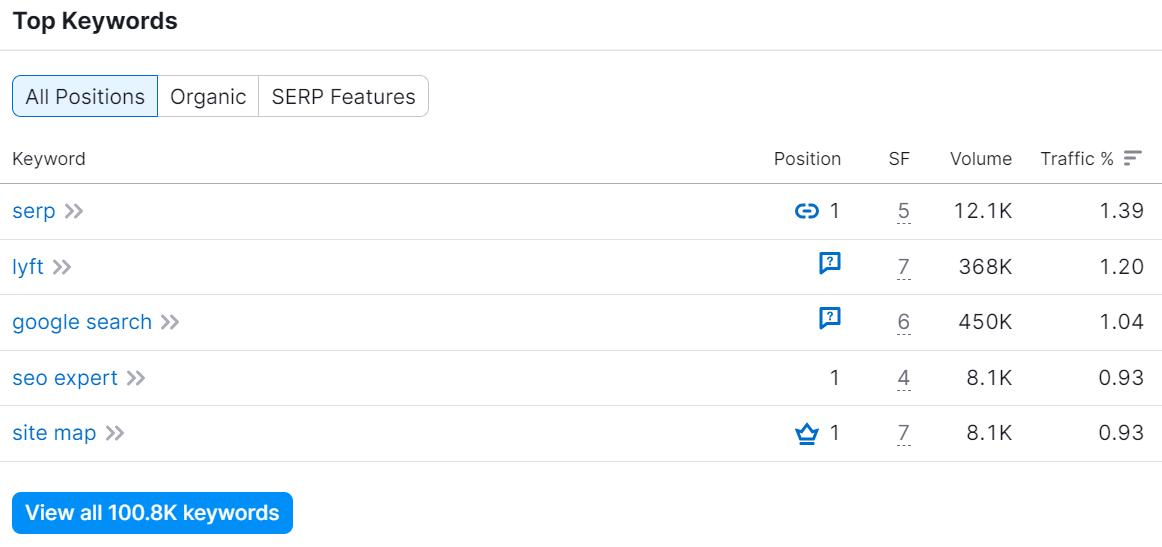
Next, we have competitors' keywords; whatever keywords your competitors are using, you can target that particular keyword here. Here I have data from Semrush tool about our competitor.

Next, we have geo-targeted. Just like you can mention your keyword like marketing in Dali. Dali is geocentric. In Dali is geographical here, okay? That is known as a targeting keyword in which you can target some particular product or brand or competitor or your geographical location.
keyword types by length
We also have keyword types by length.
- Short tail keywords (Generic keywords)
- Mid-tail keywords
- Long tail keywords
Short tail keywords (Generic keywords):
If you have only a one or two-word keyword, that keyword is known as a generic keyword or that keyword is your short-tail keyword.
For example, “marketing”; is a generic keyword.
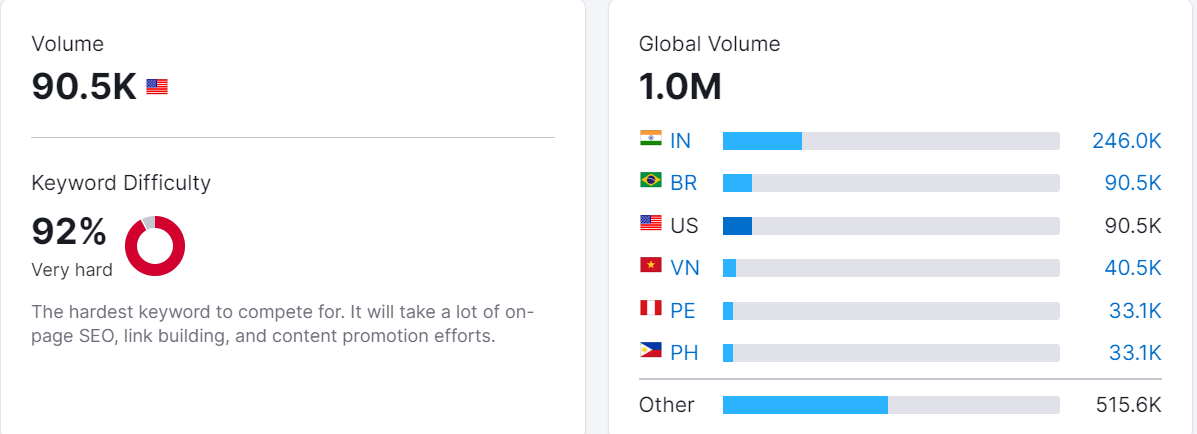
This is a very basic keyword behind this particular keyword; you can say that your user's intention may be just to gather information. So, in that particular keyword, you have a lot of data to showcase your client. So this is a very generic keyword, and that's why on that particular keyword, you have a very high search volume. In the image, you can see it has a 1M global volume and 92% KD.
Mid-tail keywords:
We have a mid-tail keyword, which is longer than your short-tail keywords and shorter than your long-tail keywords. And what is this mid-tail keyword? It is in that case where you can use any suffix or prefix after your generic keyword. Let us suppose here you can take an example that is “the importance of marketing”.
Marketing is your general keyword. If you add "the importance of" here, “the importance of marketing” this is your mid-tail keyword.
.webp)
In the case of a mid-tail keyboard, we also have a volume that is less than your general keyword but more than your long-tail keyword. Also, the KD will be less than the generic keyword and more than the long-tail keyword.
Long-tail keywords:
Next, we have a specific long-tail keyword. It's when your client and customers define their requirements, like in this example for “the importance of SEO in marketing”.
Customers define a complete query as complete information about their query. So these have a search volume that is very low but has a high conversion rate because, as we can say, what is the best deal on Nike running shoes?
It means that the customer is ready to purchase that particular item, but they are exploring some more about that. So this type of keyword we have to use on our website. These are very specific but have high conversion rates.
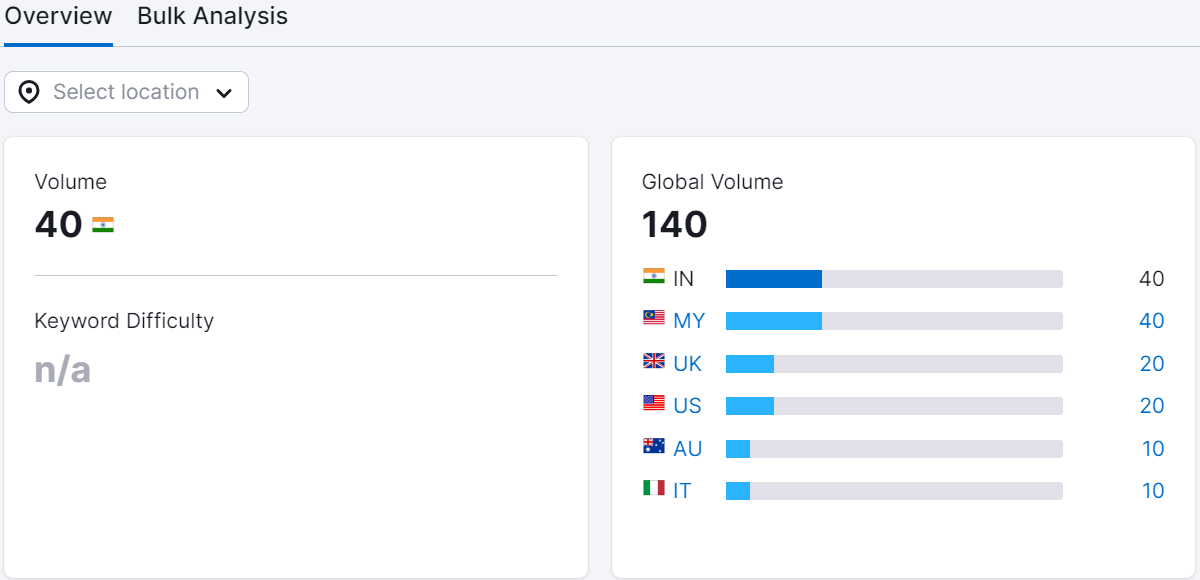
These types of keywords also have low competition and low KD just because of a long keyword.
On-site Keywords
In the case of the on-site keyword. Here you can also say organic keyword if you want to rank your website organically on Google search engine result page. Then you have to figure out these types of keywords. Here we have two types of keywords that we are using on our website.
- Primary Keywords (Main Keywords)
- Secondary Keywords (Related keywords)
Primary Keywords (Main Keywords):
First, we have a primary keyword, primary keyword, or you can say your main keyword. The main term that you target on your webpage, okay? So this is your primary keyword here, which you include in your title, in your meta description, and your images. So this is the main keyword here you have to figure out.
Secondary Keywords (Related keywords):
After your main keyword, you also have to figure out your related keywords related to your primary keyword, okay? For example, if your primary keyword is women's running shoes, okay? Then your related keywords could be women's running shoe reviews, women's running shoe sales, and the best women's running shoes. These are all your related keywords.
So when you start writing an article based on these keywords, then in that case, you can mention your primary keyword in your title, in your meta description, in your image alt, in your internal linking, and you can mention your LSI keywords or you can say your related or latent semantic keywords in the body, in the description part. So these are your on-site keywords here.
Google Ads Keywords
Google Ads keywords that we can use when we create Google Ads for doing paid advertisements or for creating paid results. We are using these types of keywords here.
Here we have four types of keywords.
- Broad match keywords
- Phrase match keywords
- Exact match keywords
- Negative keywords
In the case of broad match keywords, we have examples of shoes for sale. Broad match means that in any phrase, if you found this particular keyword, then your advertisement is visible in front of these users. In case of phrase match, it means that if your targeted audience can type this particular keyword,
Choose a keyword and add a prefix or suffix to it, like "women's shoe sales" or "stores for women's shoes." For this type of keyword, this is known as your phrase match keyword. It means if your audience adds any suffix or prefix after their main keyword, in that case, your ad is showcased there.
We have an exact match. Here you can target your keyword in this way if your audience can type the exact keyword only, then your ad is visible there.
Negative keywords mean the keywords that you don't want your ads will showcase.
Buyers’ Keywords
In the case of buyers, we can detect our buyers’ intention behind the keyword. I short identification of informational, navigational, commercial, and transactional keywords based on user intent.
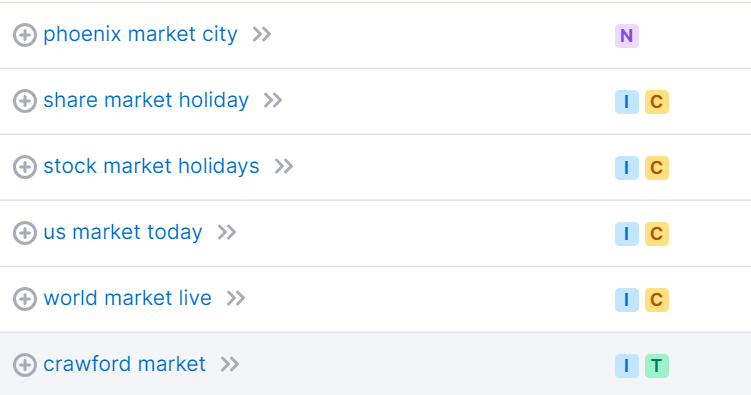
In this image, N, I, C, and T represent navigational, informational, commercial, and transactional respectively.
For example, the first is informational keywords. If your targeted audience wants to get some information about that particular keyword.
Next, we have navigational keywords. In the case of navigational, they just want to explore more options in their purchasing journey.
Next, we have transactional keywords in which your user intent is transactional. They just want to chase a particular item.
In the case of commercial keywords, the user wants to investigate brands or services.
Okay, so this type of keyword can provide us the search intent of the user, this type of keyword is known as a buyer's keyword.
Importance of Keywords
After discussing different types of keywords, we now understand the importance of keywords and why they are significant.
Marketing can target the keywords because they are important. When your website ranks at the top of the search results, that keyword generates free website traffic for you. And if you have an advertising budget, you can place pay-per-click ads on specific keywords.
That is how Google Ads operate. Advertisers bid for the space at the top of a result page for the specific keyword.
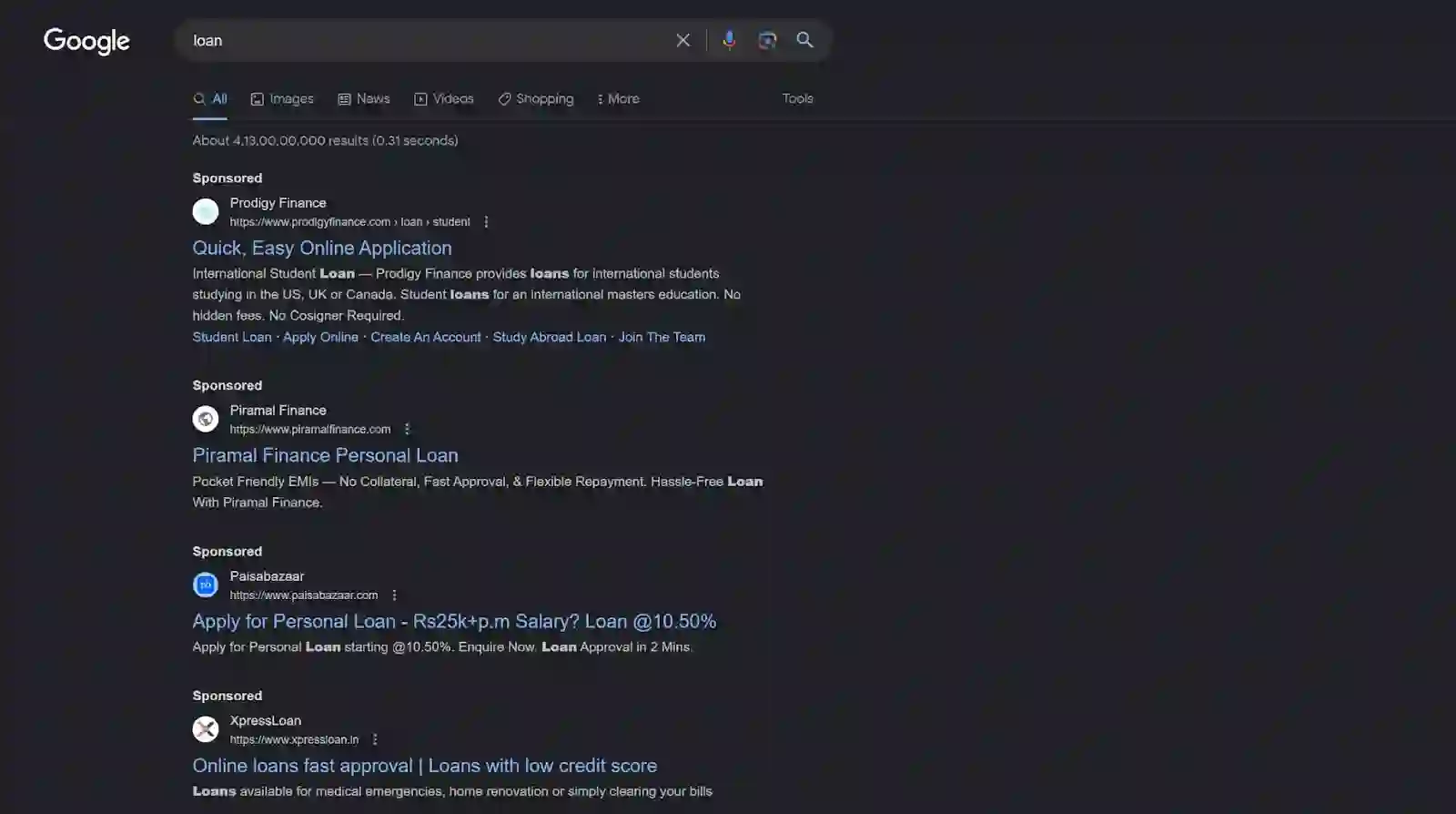
For example, the keyword "loan" has four advertisements at the top of the result. Keywords are crucial for SEO as they help in ranking higher on search engine result pages.
Why Choose Keywords?
Why did we choose keywords? What happens if we do not choose keywords?
For an online business, keywords are your strategy. They are the battles you choose to fight in the hope of outdoing your competitors and directing the people using search engines in your market to your site instead of theirs.
When you look at the keywords that a site has ranking for, you can see the website's strength and the area where it excels over its competitors. When we look at all the keywords' positions, we can understand what their website is and what product they are marketing online.
Qualities and Competitiveness of Keywords?
Next, we have the qualities of a keyword. If I'm searching for any particular keywords, these are the things that we have to target in my mind just to improve the quality of keywords here.
First of all, we have search volume. If you are searching for any keyword, then you must make sure that this particular keyword has some search volume.
We have competition. For the competition, you don't need to pick a highly competitive keyword or a low-competition keyword with no search volume. So, in that case, you have to choose that competition that has some search volume as well and also having low and medium competition.
We have intent. When exploring keywords, consider the users' intent. They want information, have informational content, want to do transactions, transactional content, or have commercial content. So, you have to figure out the content of the user behind any particular keyword here.
Okay, so next, we have the competitiveness of a keyword. In the case of competitiveness, how can we detect our competition?
Searching for competition means finding out what you need to do to rank your website for a specific keyword. Now we have two factors to consider when deciding whether to choose this keyword or not.
The first one, we have is our keyword difficulty. Using a keyword research tool here, we can detect the keyword difficulty of any particular keyword. So, this matrix tells you how competitive it is to rank organically at the top of the result page.
If your keyword difficulty is high, in that case, it is more difficult to rank your website.
If your keyword difficulty is low, let's suppose it is 30%, it is 50%, in that case, you can choose that particular keyword. In that case, it is more easy as a comparison to high-difficulty keywords to rank your website organically. So, this is based on how strong and reputable the websites are that are already on the first page.
Okay, next we have competitive density. So, this matrix tells you how competitive it is to rank in the advertisement at the top of the result.
Competitive density is used for your paid searches, for your advertisement part.
Keyword difficulty is for your organic keyword, okay, for your on-site keyword. This is for your ads keyword. Okay, so this is based on how expensive the bids are and how strong the current advertisers are. Okay, so based on that, we can decide the competitiveness of a keyword here.
Next, we have keyword research. What is keyword research? Keyword research is finding popular search terms. These terms are then used in your content.
This helps your content appear higher on search engine result pages. So, this particular activity is known as keyword research here.
Why is Keyword Research Important?
Why are we doing keyword research here? The answer is, that it allows you to see the volume and the competition data for the keywords you are considering using. It also supports any changes you need to make to your chosen keyword going forward.
Because, as we all know, the keyword is the backbone here. So, just like research is the backbone of your keyword clustering. That's why we can see that our keyword research is important here. To do keyword research a tool is important.
Note: Free keyword research tool to use - Ubersuggest.
So, this is just the basics of keyword research. In our upcoming module, I have a lot to discuss about keyword research. So keep checking AnyBlogsView.
